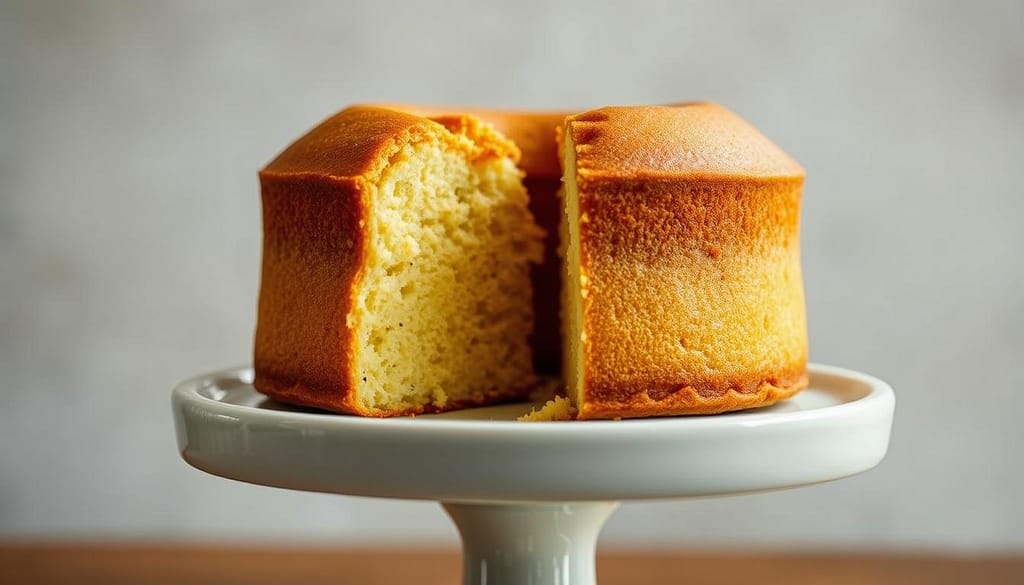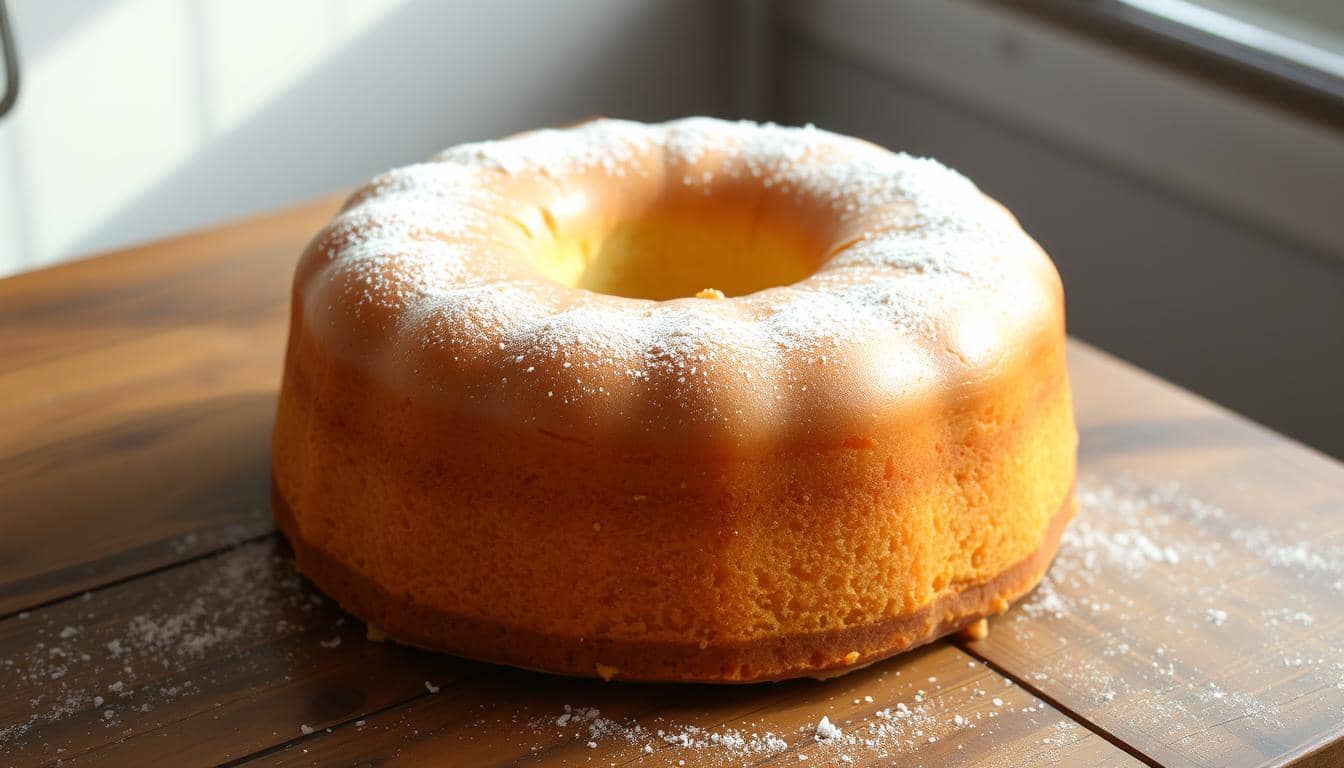After years of testing, we’ve perfected a dessert that delivers consistent, foolproof results every time. This version combines simplicity with rich flavor, using just 9 basic ingredients you likely already have. No more dry or crumbly textures—just a tender, moist crumb with the perfect balance of sweetness.
Whether you prefer a classic Bundt pan or a loaf pan, this method adapts effortlessly. The secret? Room-temperature ingredients and a low, slow bake for even cooking. It’s a versatile treat for any occasion, from family gatherings to solo indulgence.
Key Takeaways
- Tested over 7 times for guaranteed reliability
- Uses only 9 pantry staples for easy prep
- Moist, dense-yet-light texture with balanced sweetness
- Works in Bundt or loaf pans for flexibility
- Pro tip: Room-temperature ingredients ensure smooth batter
Why You’ll Love This Cream Cheese Pound Cake Recipe
One bowl, no fuss, and bakery-level results every time. This dessert combines rich butter with a hint of tang for a balanced flavor that’s hard to resist. Unlike dry traditional pound cakes, the added moisture keeps each slice tender for days.

Prep couldn’t be simpler—just mix everything in a single bowl. No extra dishes, no complicated steps. Plus, it freezes beautifully for up to 3 months, making it ideal for last-minute guests or holiday gifting.
Whether you’re hosting brunch or craving a sweet treat, this recipe delivers. It’s as impressive as a bakery buy but with the warmth of homemade. Pro tip: Slice and freeze individual portions for easy thawing anytime.
Essential Ingredients for the Perfect Pound Cake
Great desserts start with quality ingredients—here’s what makes this one exceptional. Each component plays a critical role in texture and flavor. Let’s explore the must-haves for a tender, moist crumb.
Butter & Cream Cheese: The Foundation
Unsalted butter is non-negotiable—it lets you control the saltiness. Use 1.5 cups (340g) at room temperature for easy creaming. Cold butter won’t blend smoothly, leading to lumps.
Brick-style cream cheese (8 oz/226g) adds richness and prevents dryness. Avoid tubs—they contain stabilizers that alter the texture. *Pro tip*: Cube both ingredients to speed up softening.
Eggs & Sugar: Binding and Sweetness
Six large eggs provide structure and moisture. They act as emulsifiers, blending fats and liquids evenly. Room-temperature eggs integrate faster, reducing overmixing.
Granulated sugar (2 cups) sweetens and aerates the batter when creamed. For depth, substitute ¼ cup with brown sugar. Just note: it may darken the crumb slightly.
Flour & Leavening Agents: Structure and Lift
Cake flour (3 cups/354g) is ideal—its lower protein content ensures tenderness. If using all-purpose flour, replace 2 tbsp per cup with cornstarch.
Only ½ tsp baking powder is needed. Too much causes uneven rising or a bitter aftertaste. Sift with flour to distribute evenly.
| Ingredient | Role | Pro Tip |
|---|---|---|
| Unsalted Butter | Adds richness, softens texture | Cube for faster softening |
| Cream Cheese | Prevents dryness, adds tang | Use full-fat brick style |
| Eggs | Bind ingredients, add moisture | Room temp blends easier |
| Sugar | Sweetens and aerates | Mix granulated + brown |
Step-by-Step Cream Cheese Pound Cake Instructions
Ready to bake a showstopper? Follow these foolproof steps for perfect results. Each stage—from mixing to baking—ensures a tender crumb and golden crust. Let’s dive in.
Prepping Your Pan and Oven
Start by preheating your oven to 325°F. This lower temp prevents over-browning. For the pan, a 10–12 cup Bundt (like Nordic Ware) works best.
Grease every crevice with butter or baking spray. A silicone brush helps reach tight spots. Dust lightly with flour for extra insurance against sticking.
Creaming Butter and Sugar to Perfection
Use a mixer on medium speed to blend softened butter and sugar. Aim for 2 minutes—it should look fluffy and pale. Scrape the bowl sides with a spatula halfway through.
Pro tip: Under-creaming leads to dense texture; overdoing it adds too much air.
Incorporating Eggs and Dry Ingredients
Add eggs one at a time, letting each blend fully before the next. This prevents curdling. For dry ingredients, sift flour and baking powder together.
Gently fold flour into the batter in three batches. Stop as soon as streaks disappear—overmixing toughens the crumb.
Baking Low and Slow for Even Cooking
Pour batter into the prepared pan. Bake for 75–95 minutes. At the 40-minute mark, tent foil loosely over the top to avoid over-browning.
Test doneness with a toothpick—it should come out clean. Cool 15 minutes in the pan, then transfer to a rack.
Common Pound Cake Mistakes to Avoid
Even experienced bakers can stumble on these common pitfalls—here’s how to dodge them. From mixing mishaps to oven blunders, small tweaks ensure a flawless dessert every time.
Overmixing the Batter
Aggressive blending develops gluten, leading to a dense crumb. Mix just until streaks disappear—about 30 seconds after add eggs. Pro tip: Use a spatula for the final folds.
Using Cold Ingredients
Butter, eggs, and dairy must be at room temperature (68–72°F). Cold ingredients cause separation, resulting in uneven texture. Plan ahead: set them out 1–2 hours before baking.
Skipping the Foil Tent
After 40 minutes, loosely cover the top with cake aluminum foil. This prevents burnt edges while the center finishes baking. Forgot? A light sugar syrup can salvage overbrowned tops.
- Undercooked vs. Overbaked: A toothpick should have moist crumbs—not wet batter or dry crumbs.
- Sunken Center? Check oven temp with a thermometer; underbaking is the usual culprit.
- Mixer Speeds: Medium for creaming, low for dry ingredients to avoid toughening.
Tips for a Moist and Flavorful Pound Cake
Master the art of moisture with these simple but effective techniques. A tender crumb and rich flavor depend on smart ingredient swaps and careful handling. Follow these steps to elevate your dessert every time.
Boost moisture with sour cream or Greek yogurt. Both add richness without heaviness. For tangy depth, try full-fat versions.
- Flavor twists: Add lemon zest or almond extract for brightness.
- Syrup trick: Brush warm cakes with vanilla syrup for extra softness.
- Storage: Wrap cooled cakes in foil to lock in freshness.
Let your dessert cool for at least 2 hours before slicing. Rushing this step can cause crumbling. Patience pays off with perfect slices.
For a glossy finish, dust with powdered sugar or drizzle with citrus glaze. These small touches make a big impact.
Serving Suggestions and Toppings
Transform your dessert into a showstopper with these simple yet elegant serving ideas. Whether you prefer classic combinations or creative twists, the right accompaniments enhance both flavor and presentation.
Whipped Cream and Fruit Pairings
Stabilized whipped cream holds its shape for hours. Just add 1 tbsp cornstarch per cup of cream during whipping. For freshness, top with seasonal fresh berries like strawberries or raspberries.
- Summer: Try peaches with vanilla-infused cream
- Winter: Pomegranate seeds add festive color
- Year-round: Lemon curd swirls create tangy contrast
Drizzles and Glazes
A simple glaze adds shine and sweetness. Mix 4 oz softened cream cheese with 1 cup powdered sugar and 2 tbsp milk. For salted caramel, simmer 1 cup sugar with 6 tbsp butter until amber-colored.
“The secret to glossy glazes? Apply while the dessert is slightly warm—it absorbs better.”
Perfect Beverage Matches
Pair with medium-roast coffee to balance richness. Iced tea lovers should try hibiscus or peach flavors. For special occasions, sparkling wine cuts through the sweetness beautifully.
Creative Variations to Try
Elevate your dessert game with these unique flavor combinations and techniques. A few simple tweaks can transform your basic recipe into something extraordinary. Whether you prefer citrusy brightness or rich chocolate swirls, these ideas deliver delicious results.
Lemon or Almond Infusion
For zesty freshness, add 1 tsp lemon extract and 2 tbsp zest to your batter. The citrus cuts through richness beautifully. Almond lovers can substitute 1 tsp vanilla with almond extract for nutty depth.
Work zest into sugar first to release oils. This boosts flavor distribution. Both variations pair perfectly with berry toppings or light glazes.
Chocolate Swirl or Spiced Version
Create marbled magic by folding ¼ cup cocoa powder into half the batter. Layer alternately in your pan before swirling gently with a knife.
For winter warmth, mix in ½ tsp cinnamon and ¼ tsp nutmeg. These holiday spices add cozy complexity without overpowering the cream cheese tang.
Mini Pound Cakes for Portion Control
Use 6-cup Bundt pans or loaf tins for individual servings. Reduce baking minutes to 45-55, checking doneness early. Mini versions bake faster and make ideal gifts.
Try these pro adjustments:
- Citrus zest: Microplane directly over batter for even distribution
- Cocoa powder: Sift with 1 tbsp sugar to prevent clumping
- Spice blends: Toast whole spices and grind fresh for maximum aroma
Each variation maintains the tender crumb you love while offering new taste experiences. Mix and match to discover your signature style.
Conclusion
Generations have cherished this dessert for its foolproof simplicity. Remember: room-temperature ingredients and gentle mixing ensure a tender crumb. Share the tradition—bake it with loved ones or gift a loaf wrapped in foil.
Grab our printable recipe card below, and tag your creations with #FamilyBakes. Need a pro tip? Slice with a serrated knife for clean edges. Happy baking!

